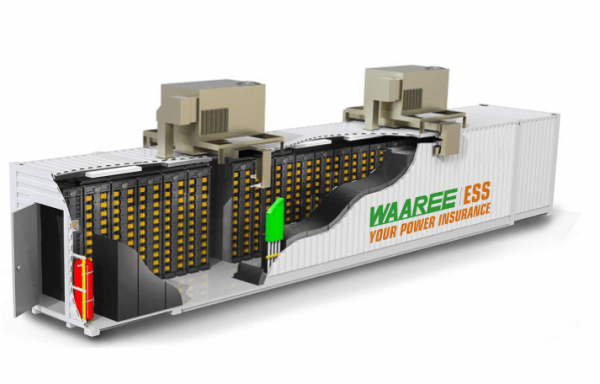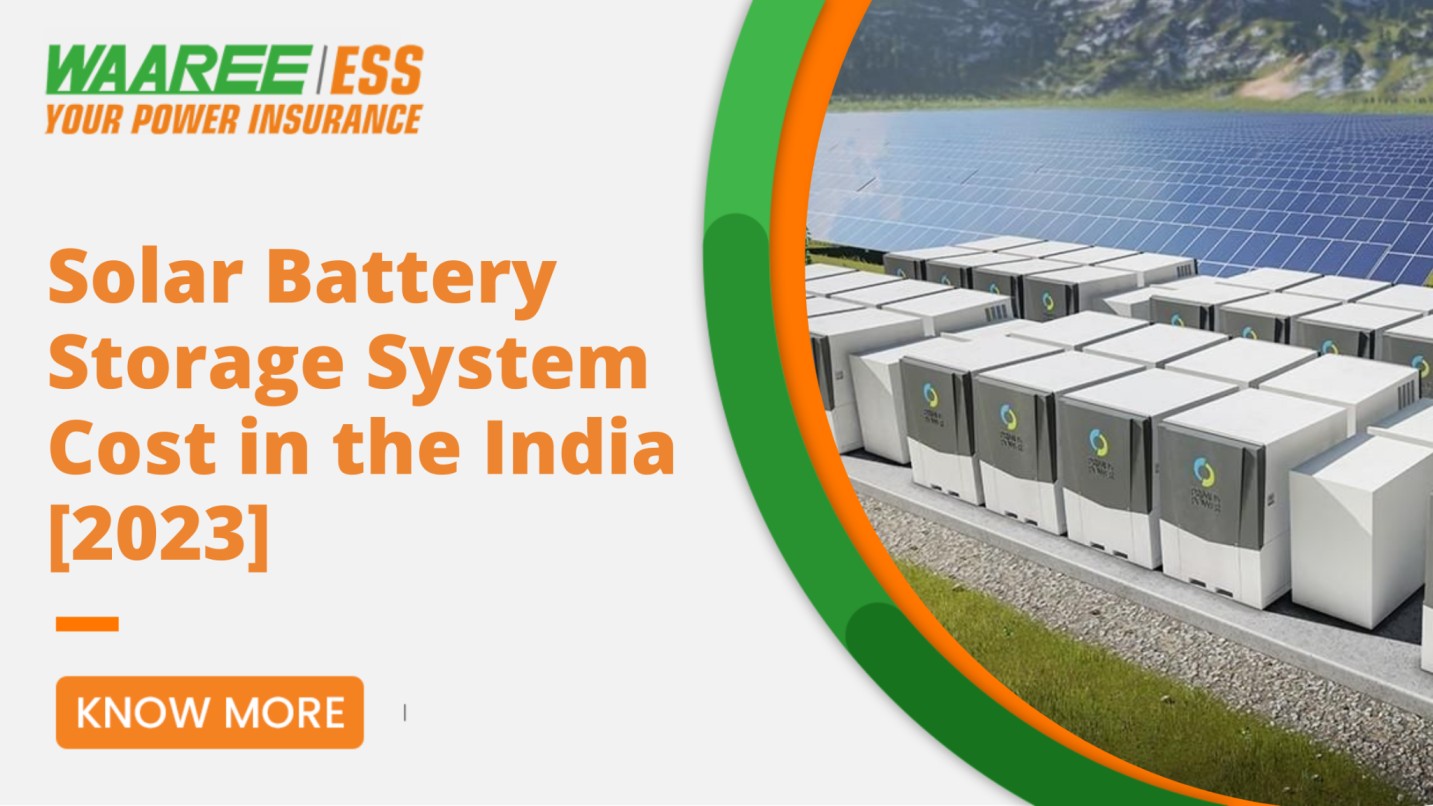Solar energy has been growing in popularity as an alternative energy source, with many households and businesses making the switch. Solar battery storage systems play a crucial role in the effective utilization of solar energy and offer a cost-effective solution for storing excess energy for future use. In this blog, we will explore the cost of solar battery storage systems in India in 2023.
The cost of a solar battery storage system depends on various factors such as the size of the system, the type of battery used, and the vendor you choose. The most common type of battery used in solar energy storage systems is the Lithium-Ion Solar Battery. Lithium-ion batteries offer a high energy density, long cycle life, and low self-discharge rate, making them ideal for solar energy storage.

The cost of a lithium-ion solar battery is dependent on its capacity, which is measured in kilowatt-hours (kWh). The average cost of a solar battery in India ranges from INR 90,000 to INR 2, 50,000 for a 6 kWh battery. A higher capacity battery will cost more, but it will also store more energy and last longer.
Solar energy storage systems also come in different sizes, with different capacities and features. The size of the system you choose will also affect the cost. A 5kW solar energy storage system in India can cost anywhere from INR 3,00,000 to INR 8,00,000, depending on the features and capacity you choose.
Also Read More: 5kW Solar Systems Price in India [2023]
The cost of a solar battery storage system also depends on the vendor you choose. Some vendors offer their own brand of lithium-ion solar batteries, while others sell third-party batteries. It is essential to do your research and compare prices and features to find the best solar battery storage system for your needs.
In 2023, the cost of solar battery storage systems is expected to decrease as the technology continues to improve and become more affordable. Battery Energy Storage Systems are becoming increasingly popular and efficient, making them a cost-effective solution for storing excess solar energy.
Are Solar Batteries Cost-Effective?
In recent years, the use of solar batteries has increased greatly. With more and more people switching to solar power to reduce their carbon footprint and save money on electricity bills, the question of cost-effectiveness has come up. Are solar batteries worth the investment, or is it just a trend that will die down soon? This blog will explore the cost-effectiveness of solar batteries and why they are worth the investment.
Rechargeable solar batteries store energy generated by solar panels. This energy can then be used at night or during periods of low sunlight, reducing the need to rely on grid-supplied electricity. The cost of solar batteries varies depending on the size of the system, the brand, and the quality of the components. However, it is possible to find systems that cost less than $1,000.
The cost-effectiveness of solar batteries is determined by two factors: the cost of electricity from the grid and the cost of solar panels. In some areas, electricity from the grid is expensive, which makes the use of solar panels more cost-effective. On the other hand, if electricity from the grid is cheap, the cost of solar panels may be higher, making them less cost-effective.
See Also: Top 10 Solar Battery Companies in India
The cost of solar panels has dropped dramatically in recent years, making them more accessible and cost-effective for a wider range of people. The cost of solar panels has dropped by more than 70% since 2010, making them more affordable for the average homeowner. In addition, many local and federal government programs offer incentives for the installation of solar panels, which can further reduce the cost of installation.
In addition to reducing the cost of electricity, solar batteries also offer other benefits. For example, they provide backup power in the event of a power outage, which is especially important in rural areas where power outages are more common. Solar batteries can also be used to reduce the overall cost of electricity by providing a source of power during periods of low sunlight, reducing the need to rely on grid-supplied electricity.
Another factor to consider is the lifespan of solar batteries. Most solar batteries have a lifespan of between 5 and 10 years, depending on the brand and quality of the components. This means that the cost of replacing the battery must be taken into consideration when calculating the cost-effectiveness of the system.
What are the benefits of solar battery storage?
- Energy independence and backup power: Solar battery storage systems allow you to store excess solar energy generated during the day and use it at night or during power outages.
- Cost savings: By using stored solar energy instead of grid-generated power, you can reduce your monthly electricity bills and save money in the long run.
- Improved grid stability: By providing grid-independent power during times of high demand, a solar battery storage system can help to reduce strain on the grid and improve overall stability.
- Increased energy efficiency: Solar battery storage systems are designed to maximize energy efficiency, reducing the amount of energy lost during storage and use.
- Improved resiliency: A solar battery storage system can provide a reliable source of power during times of natural disasters or other emergencies.
- Increased renewable energy usage: Solar battery storage systems help to promote the use of renewable energy sources, reducing dependence on non-renewable energy sources and helping to protect the environment.
Read About: Advantages and Disadvantages of Lithium-ion Battery
What Types of Solar Batteries Are There?
- Lead-Acid Batteries: These are the traditional type of batteries used for solar power storage. They are affordable and have been around for many years.
- Lithium-Ion Batteries: These are lighter and more efficient than lead-acid batteries and have a longer lifespan.
- Nickel-Cadmium Batteries: These are also known as NiCad batteries. They are relatively low-cost, but have a shorter lifespan than lithium-ion batteries.
- Sodium-Sulfur Batteries: These are high-temperature batteries that are used in large-scale energy storage systems.
- Flow Batteries: These are a type of rechargeable battery that use two tanks of electrolyte solutions that are pumped through a cell to generate electricity.
- Zinc-Carbon Batteries: These are disposable batteries that are used in low-power solar energy storage systems.
It is important to choose the right type of battery for your solar power system based on factors such as cost, efficiency, lifespan, and compatibility with your solar panels.
What Are the Pros & Cons of Solar Batteries in a tabular form?
Pros:
| Pros | Explanation |
| Independence | Solar batteries provide independence from the grid, allowing homes and businesses to store energy for use at any time. |
| Cost Savings | By reducing dependence on the grid, solar batteries can help reduce energy costs. |
| Increased Energy Efficiency | Solar batteries allow for energy to be stored during peak energy production times and used during low production times, leading to increased energy efficiency. |
| Emergency Power Supply | Solar batteries can be used as an emergency power supply during power outages. |
| Increased Renewable Energy Use | Solar batteries help increase the use of renewable energy by allowing it to be stored and used when needed. |
Cons:
| Cons | Explanation |
| Initial Cost | Solar batteries are expensive, with the cost of installation being a major barrier to entry. |
| Maintenance | Solar batteries require maintenance and may need to be replaced after a few years, adding additional costs. |
| Limited Storage Capacity | Solar batteries have limited storage capacity, so users may need to purchase multiple batteries to store enough energy. |
| Disposal Issues | Solar batteries can pose disposal issues due to the toxic chemicals they contain. |
| Climate Considerations | Solar batteries may not perform well in extreme temperatures, which can affect their lifespan and efficiency. |
What Is the Lifespan of a Solar Battery?
The lifespan of a solar battery depends on several factors such as the type of battery, the manufacturer, the environmental conditions, and the maintenance. On average, the lifespan of a solar battery can range from 5 to 15 years. Lithium-ion batteries, for example, have a longer lifespan compared to lead-acid batteries. However, proper maintenance and storage of the battery can extend its lifespan.
What Is the Best Solar Battery in India?
It depends on your specific needs and requirements, but some of the best solar batteries in India are:
- Waaree ESS
- Livguard Energy Pro Solar Inverter Battery
- Exide Solar Tubular Battery
- Luminous Zelio+ Solar Battery
- Sukam Solar Tall Tubular Battery
- Okaya Solar Battery
These batteries have a reputation for being reliable, long-lasting and providing efficient performance. It’s recommended to consider factors like capacity, warranty, and compatibility with your solar panel system before making a decision.
Waaree ESS is India’s leading manufacturer of Solar Battery Storage System in India. They manufacture BESS, EV Battery, Telecom UPS, etc. To know more about the product offerings visit over website.
Read Further: Lithium Ion Battery Price in India [2023]



Leave A Comment
You must be logged in to post a comment.